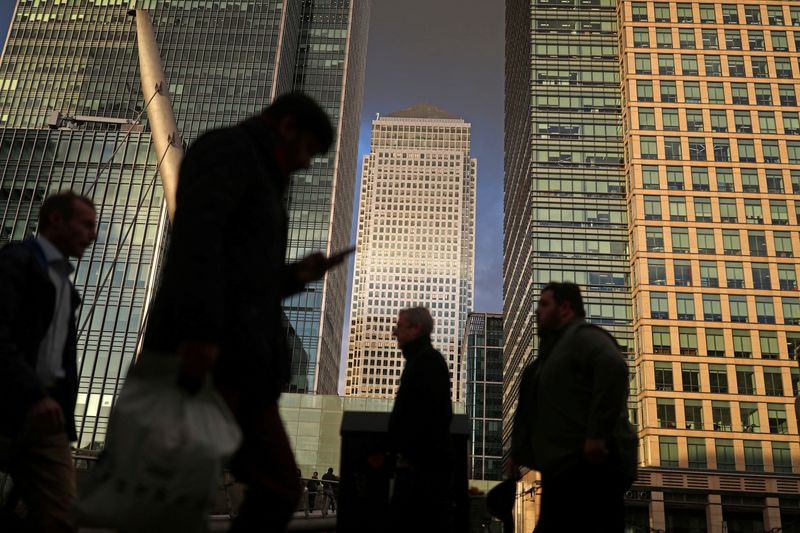By David Milliken
LONDON (Reuters) -Britain's services sector suffered its biggest loss of momentum last month since the country was last in lockdown, as the spread of the Omicron variant of coronavirus hammered hospitality and travel, a survey showed on Thursday.
The IHS Markit/CIPS services Purchasing Managers' Index (PMI) fell to a 10-month low of 53.6 in December from 58.5 in November, according to final data, which was a fraction stronger than a preliminary "flash" reading of 53.2.
The composite PMI, which includes Tuesday's more upbeat manufacturing PMI, showed a similar move.
"Mass cancellations of bookings in response to the Omicron variant led to a slump in consumer spending on travel, leisure and entertainment," IHS Markit economist Tim Moore said.
Some 45% of hospitality businesses and 50% of firms such as beauticians and hairdressers reported increased cancellations in the run-up to Christmas, according to separate figures released by the Office for National Statistics on Thursday.
The last time the services PMI was lower was in February 2020 when the economy was still under lockdown, and restaurants and non-essential shops were closed to the public.
December's data was above the 50 mark that normally separates growth from contraction, but economists said the scale of the fall increased the chances that official data due next month would show the economy shrank in December.
"Disruption from the current scale of infections risks worsening supply bottlenecks, particularly labour shortages. And combined with a deterioration in high-frequency indicators, the latest PMIs reinforce the likelihood that GDP fell in December," said Martin Beck, chief economic adviser to EY ITEM Club.
Pantheon Economics forecasts a 0.6% fall in GDP for December and a 0.3% decline for January.
"That said, we can't rule out a rise in GDP in January if consumers feel more confident to risk contracting COVID-19, now that Christmas is out of the way and people know that Omicron is less likely to result in serious illness than Delta," said Gabriella Dickens, senior UK economist at Pantheon.
NO NEW LOCKDOWN
Unlike during the wave of COVID-19 cases last winter - when few Britons had been vaccinated - this year Prime Minister Boris Johnson has rejected new legal restrictions in England, although curbs on hospitality apply elsewhere in the United Kingdom.
Moreover, many Britons have also followed health advice to work from home where possible and limit social gatherings. Retail footfall in the week to Jan. 2 was 25% lower than its level in the equivalent week of 2019, the ONS said.
Services businesses were more upbeat for 2022 as a whole, however, with 55% expecting output to rise compared with 10% predicting a decline, IHS Markit said.
But many economists expect a big squeeze on consumer demand this year from sharply rising inflation, which the Bank of England forecasts will peak at a 30-year high of around 6% in April, just as the government raises taxes on workers.
The BoE also started last month to raise interest rates from their record-low 0.1% to tackle longer-term price pressures.

"Many businesses cited the need to pass on escalating costs to clients over the course of 2022," Moore said, adding that firms faced pressure to raise pay in a competitive job market.
Both the 'prices charged' and the input costs components of the services PMI in December were well above their levels at the start of 2021, although down from peaks a few months earlier.